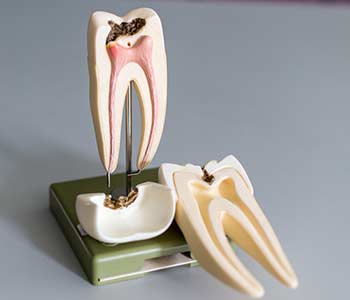Dentist in Quincy, MA explains how a root canal affects your overall health

Root canals have a bad reputation of being painful and complex dental treatments. As dental practitioners, we have heard it all! However, with modern advances in tools, methodologies, and materials, root canals nowadays can provide patients rapid relief from pain and are a more comfortable experience than ever before. This highly effective treatment can not only improve the health of the affected tooth, but also the health of your whole mouth and overall wellbeing. Here, Dr. Matarazzo in Quincy, MA answers common questions about root canals and how a root canal affects your overall health.
What is a root canal?
A root canal is a dental procedure that is used to save a severely compromised tooth. A tooth is a comprised of an outer layer of enamel, and underneath is a layer of dentin. The center of the tooth is called the pulp chamber, which contains the pulp, tooth nerve, and blood vessels. In a root canal, the contents of the pulp chamber are removed, the area is sanitized, and then filled with a material called gutta-percha. Then, a crown is typically placed on top of the tooth to provide long-term protection.
How does a root canal relieve pain?
By removing the damaged or infected tissue and nerve, the tooth is restored to health and the patient’s pain is immediately relieved because (a) the source of pain is gone, and (b) the nerve that senses pain is gone. While nerves are an important part of your tooth anatomy because they prevent you from biting down too hard or eating too hot of foods or liquids, it is fine for the nerve in one tooth to be removed because all of your teeth work together to deliver these signals to your brain.
When is a root canal recommended?
A root canal may be recommended if you have one or more of the following issues:
- Severe chip or crack in the tooth
- Traumatic injury to a tooth that has injured the pulp
- A large or deep cavity in the tooth
- Infection or abscess
How does a root canal affect your overall health?
Root canals have many benefits for your oral and overall health. By saving the affected tooth with a root canal, you can avoid extraction and costly restorations such as dental implants or bridges, as well as avoid the need to compromise surrounding healthy teeth to support the restoration.
Often, the affected tooth has bacterial overgrowth or infection. The oral bacteria that cause these infections have been linked to several systemic health issues, such as heart attacks, diabetes, coronary artery disease, and more. In fact, a recent study at the University of Helsinki showed that patients in need of a root canal that were untreated were up to 2.7 times more likely to have acute coronary syndrome.
By treating your affected tooth, you eliminate the infectious source of the bacteria so your body can begin to heal itself.
Do root canals cause cancer?
No. There is a long-standing myth that root canals cause cancer or other diseases. This idea originated from the work of Dr. Weston Price, an early 20th century dentist who ran experiments that were poorly designed and had flawed methodology. There is no current valid scientific evidence that root canals lead to health issues such as cancer.
Is it better to have a tooth pulled than to have a root canal?

No. Saving your natural tooth when possible is always better than pulling out (extracting) your tooth. When a tooth is missing, it causes your other teeth to shift in your mouth, the loss of jaw bone in the area, and can cause your face to become sunken in appearance, making you look older than you are. Dental restorations to replace the missing tooth are time-consuming and expensive, and certain types of restorations need to be replaced over time. No dental restoration can match the look, feel, and function of a natural tooth!
Schedule an appointment today
Stop suffering from the negative effects of a decayed or infected tooth! You can experience relief from pain and systemic inflammation by scheduling a consultation with Dr. Stephen Matarazzo. He will listen to your symptoms and thoroughly examine your mouth to determine what is causing your pain. If a root canal is recommended, Dr. Matarazzo will guide you every step of the way to make sure you are comfortable and knowledgeable about your treatment.
Call Dr. Matarazzo’s dental practice, conveniently located at 300 Crown Colony Drive in Quincy, MA, at (617) 405-3939 to schedule your appointment today!
Share this Article
Back to Root Canals Page


















